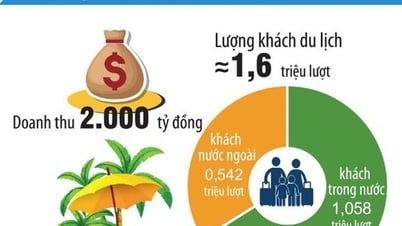No tax collection
At an online Q&A session to resolve difficulties for business households when switching to declaring based on actual revenue on June 17 organized by VNExpress newspaper, Mr. Hoang Huy in Nam Dinh said that his family has been selling rice online since 2018.
Recently, the tax authority contacted the family and announced that they would collect more than 1 billion VND from that time until now. Mr. Huy would like to ask, is there currently a regulation on collecting additional amounts and how?
Answering this question, Mr. Mai Son, Deputy Director of the Tax Department ( Ministry of Finance ), said that it is necessary to clearly distinguish between online business and the lump-sum tax form applied to fixed business households.
“Online business, similar to activities on e-commerce platforms (for which the General Department of Taxation has built a dedicated portal since last year), is characterized by clear cash flow. Therefore, individuals or online business households will declare and pay taxes each time they arise, monthly or quarterly, based on actual revenue,” said Mr. Son.

Accordingly, the tax authority will determine tax liability based on total declared revenue and the corresponding percentage of revenue.
For example, commercial business is 1.5%, service is 5%. In case the person does affiliate marketing or livestreams to sell products for the company, this income will be calculated as salary or wages.
Fixed-line businesses will declare their expected revenue for the following year. Based on this declaration, the tax authority will combine data such as store area, number of employees, monthly electricity and water costs and sales of the previous year to make an assessment.
According to Mr. Son, through the commune and ward advisory council, the expected revenue level will be determined and announced to business households before January 20 every year. This list will be made public according to regulations. After that, business households will pay taxes monthly or quarterly according to the agreed revenue level.
However, if the contracted household changes its business scale (business area, labor, revenue, etc.), it will have to notify and adjust the declaration. The tax authority will base on the declaration and database and if it determines that the contracted revenue has changed by 50% or more, it will notify the business household of the change in the contracted tax rate.
This adjustment only applies to the next reporting period and does not include any tax from previous months. This is a clear difference between online businesses and fixed businesses, although both charge tax based on the percentage of sales depending on the industry.
The Tax Department's leaders gave an example: in June, if a business household achieved 300 million VND in revenue instead of 50 million VND as usual, the business household would have to declare an adjustment to pay tax at the rate of 300 million VND in July. But if the following month it drops by more than 50%, the business household would continue to report for adjustment.
Encourage conversion to enterprise
From June 1, according to Decree 70, business households with revenue of over 1 billion VND per year in certain industries (food and beverage, hotels, retail, passenger transport, beauty, entertainment...) will have to use electronic invoices generated from cash registers, connecting data with tax authorities.
At the same time, Resolution 68 of the Politburo requires the elimination of lump-sum tax for business households by 2026 at the latest.
Mr. Son said that the lump-sum tax form is no longer suitable for the current reality because the scale of business activities has changed. Business households do not only trade at one location, they operate on e-commerce platforms and social networking platforms. Many households even have chains of stores and do business across borders.
The collection of lump-sum taxes is facing many limitations. The tax sector is moving towards reforming administrative procedures, creating more favorable conditions for business households to declare and pay taxes.
However, due to paying taxes in the form of lump sums, business households have little opportunity to enjoy tax incentives such as corporate income tax that enterprises enjoy.
Besides, calculating tax on revenue, especially for different industries and large scale, does not reflect the actual profit and loss of business households, causing unfairness.
“The tax authority always encourages business households to convert to micro-enterprise models. Business households will receive policy support from state agencies. If the business is profitable, they will contribute to the state budget; otherwise, they do not have to pay.
However, the reality shows that many business households are still hesitant due to the desire to maintain simplicity in operations, although many localities have support policies. The tax authority will continue to promote and research support solutions, helping people and business households better understand the long-term benefits and fairness of the conversion," said the leader of the Tax Department.
Source: https://vietnamnet.vn/lanh-dao-cuc-thue-noi-ve-viec-bo-thue-khoan-2412425.html




























































![[Maritime News] Wan Hai Lines invests $150 million to buy 48,000 containers](https://vphoto.vietnam.vn/thumb/402x226/vietnam/resource/IMAGE/2025/6/20/c945a62aff624b4bb5c25e67e9bcc1cb)
















































Comment (0)